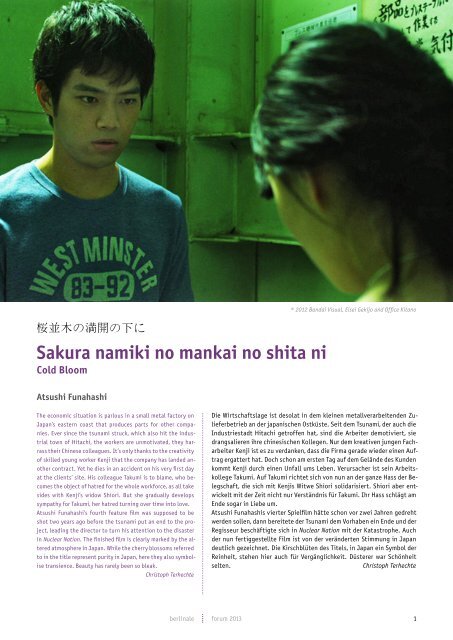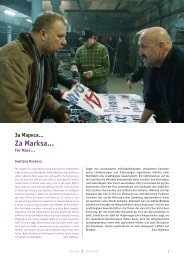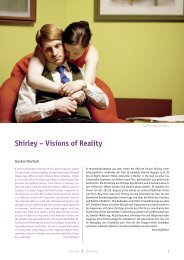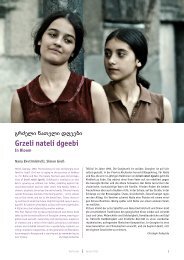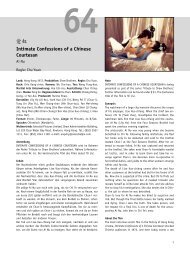Sakura namiki no mankai no shita ni - Arsenal
Sakura namiki no mankai no shita ni - Arsenal
Sakura namiki no mankai no shita ni - Arsenal
Sie wollen auch ein ePaper? Erhöhen Sie die Reichweite Ihrer Titel.
YUMPU macht aus Druck-PDFs automatisch weboptimierte ePaper, die Google liebt.
<strong>Sakura</strong> <strong>namiki</strong> <strong>no</strong> <strong>mankai</strong> <strong>no</strong> <strong>shita</strong> <strong>ni</strong><br />
Cold Bloom<br />
Atsushi Funahashi<br />
The eco<strong>no</strong>mic situation is parlous in a small metal factory on<br />
Japan’s eastern coast that produces parts for other compa<strong>ni</strong>es.<br />
Ever since the tsunami struck, which also hit the industrial<br />
town of Hitachi, the workers are unmotivated, they harrass<br />
their Chinese colleagues. It’s only thanks to the creativity<br />
of skilled young worker Kenji that the company has landed a<strong>no</strong>ther<br />
contract. Yet he dies in an accident on his very first day<br />
at the clients’ site. His colleague Takumi is to blame, who becomes<br />
the object of hatred for the whole workforce, as all take<br />
sides with Kenji’s widow Shiori. But she gradually develops<br />
sympathy for Takumi, her hatred tur<strong>ni</strong>ng over time into love.<br />
Atsushi Funahashi’s fourth feature film was supposed to be<br />
shot two years ago before the tsunami put an end to the project,<br />
leading the director to turn his attention to the disaster<br />
in Nuclear Nation. The fi<strong>ni</strong>shed film is clearly marked by the altered<br />
atmosphere in Japan. While the cherry blossoms referred<br />
to in the title represent purity in Japan, here they also symbolise<br />
transience. Beauty has rarely been so bleak.<br />
Christoph Terhechte<br />
berlinale forum 2013<br />
© 2012 Bandai Visual, Eisei Gekijo and Office Kita<strong>no</strong><br />
Die Wirtschaftslage ist desolat in dem kleinen metallverarbeitenden Zulieferbetrieb<br />
an der japa<strong>ni</strong>schen Ostküste. Seit dem Tsunami, der auch die<br />
Industriestadt Hitachi getroffen hat, sind die Arbeiter demotiviert, sie<br />
drangsalieren ihre chinesischen Kollegen. Nur dem kreativen jungen Facharbeiter<br />
Kenji ist es zu verdanken, dass die Firma gerade wieder einen Auftrag<br />
ergattert hat. Doch schon am ersten Tag auf dem Gelände des Kunden<br />
kommt Kenji durch einen Unfall ums Leben. Verursacher ist sein Arbeitskollege<br />
Takumi. Auf Takumi richtet sich von nun an der ganze Hass der Belegschaft,<br />
die sich mit Kenjis Witwe Shiori solidarisiert. Shiori aber entwickelt<br />
mit der Zeit <strong>ni</strong>cht nur Verständ<strong>ni</strong>s für Takumi. Ihr Hass schlägt am<br />
Ende sogar in Liebe um.<br />
Atsushi Funahashis vierter Spielfilm hätte schon vor zwei Jahren gedreht<br />
werden sollen, dann bereitete der Tsunami dem Vorhaben ein Ende und der<br />
Regisseur beschäftigte sich in Nuclear Nation mit der Katastrophe. Auch<br />
der nun fertiggestellte Film ist von der veränderten Stimmung in Japan<br />
deutlich gezeichnet. Die Kirschblüten des Titels, in Japan ein Symbol der<br />
Reinheit, stehen hier auch für Vergänglichkeit. Düsterer war Schönheit<br />
selten. Christoph Terhechte<br />
1
The bond of ‘minds’<br />
I’ve always had a simple question: ‘Why do human beings love/<br />
hate each other?’<br />
Is love a primitive a<strong>ni</strong>mal instinct to produce children and ensure<br />
the continuation of our genes? Gorillas and elephants are<br />
said to feel love and hatred too…<br />
I believe it is the ‘mind’ that makes us feel love or hatred for<br />
other humans. The world is full of irrational hatred. A particular<br />
way of thinking leads us to condemn others. Our ‘minds’ can<br />
also transcend negativity and turn it into acceptance. But we<br />
can’t control how our ‘minds’ make us feel.<br />
Sometimes we love/hate others viscerally, for <strong>no</strong> defined reason.<br />
Or it’s our culture, customs or patriotism – all constructed<br />
values – that affect our feelings.<br />
Sometimes, just one word can be the catalyst that changes<br />
how we feel about someone. And the smallest misunderstanding<br />
can ruin a long-standing friendship – the bond of ‘minds’.<br />
I am very interested in the subtle things that cause a shift in<br />
our ‘minds’. That’s where we find the most mysterious and endearing<br />
aspects of the human condition.<br />
Atsushi Funahashi<br />
The microcosm of the working man’s world<br />
Classical in a manner that recalls Mikio Naruse’s Scattered<br />
Clouds (1967), <strong>Sakura</strong> Namiki <strong>no</strong> <strong>mankai</strong> <strong>no</strong> <strong>shita</strong> <strong>ni</strong> dramatizes<br />
the tormented love between a widow and the man responsible<br />
for her husband’s death. By setting his story against<br />
an industrial landscape rife with post-3/11 despair, Nipponese<br />
helmer-scribe Atsushi Funahashi invests timeless themes<br />
of love and forgiveness with national relevance. Observing his<br />
protags’ painful repression with the same verisimilitude of<br />
Nuclear Nation, his docu on Fukushima evacuees, Funahashi<br />
invokes his compatriots’ courageous ability to overcome the<br />
past and embrace an uncertain future.<br />
Maintai<strong>ni</strong>ng an unhurried tempo and an air of hushed reverence,<br />
the pic furtively hints at Shiori’s loneliness and despondency<br />
even as she soldiers on, until a series of revelations by Takumi<br />
culminates in a liberating finale.<br />
The pain that engulfs the film is compounded by the factory’s<br />
atmosphere of inexorable entropy, marked by layoffs and disgruntled<br />
employees. It’s rare for a contempo Nipponese meller<br />
to focus so unblinkingly on the country’s labor problems<br />
and corporate malpractice, making Shiori’s factory the microcosm<br />
of an industrial sector rocked by recession and paralyzed<br />
by nuclear fallout. The scene in which Shiori has to beg Kitami<br />
executives to renew her factory’s contract, even though<br />
their slack safety measures led to her husband’s death, is both<br />
poignant and scathing.<br />
Although 3/11 is <strong>no</strong>t conspicuously written into the script by<br />
Funahashi and Murakoshi, the sudden tragedy that befalls the<br />
protags holds up a psychological mirror to a nation’s collective<br />
misfortune and the gross injustice it suffers. The film’s<br />
Japanese title means “under a row of sakuras in full bloom,”<br />
and a sakura tree indeed plays an inspiring role in the drama,<br />
symbolizing the pivotal moment when the Japanese, like trembling<br />
petals, are poised to plunge into the unk<strong>no</strong>wn.<br />
While the dim indoor lighting effectively makes the factory resemble<br />
a Victorian sweatshop, Koichi Furuya’s compositions of<br />
berlinale forum 2013<br />
Die Fesseln der Gedanken<br />
Schon immer hat mich eine einfache Frage beschäftigt: Warum lieben bzw.<br />
hassen die Menschen einander? Ist Liebe ein primitiver a<strong>ni</strong>malischer Instinkt,<br />
der der Fortpflanzung und damit dem Fortbestand unserer Gene<br />
dient? Es heißt, dass auch Gorillas und Elefanten Liebe und Hass empfinden<br />
…<br />
Ich glaube, dass unsere Gedanken uns Liebe und Hass fühlen lassen. Die<br />
Welt ist voll von irrationalem Hass. Eine bestimmte Art des Denkens bringt<br />
uns dazu, andere zu verurteilen. Unsere Gedanken können aber auch Negativität<br />
transzendieren und in Akzeptanz verwandeln. Allerdings können<br />
wir <strong>ni</strong>cht kontrollieren, welche Gefühle unsere Gedanken in uns entstehen<br />
lassen.<br />
Manchmal lieben oder hassen wir andere instinktiv, ohne ersichtlichen<br />
Grund. Auch unsere Kultur, unsere Gewohnheiten oder unser Patriotismus<br />
– allesamt von uns selbst konstruierte Werte – können unsere Gefühle<br />
beeinflussen.<br />
Manchmal kann ein einziges Wort der Katalysator dafür sein, dass unsere<br />
Gefühle einem anderen Menschen gegenüber sich ändern. Und das kleinste<br />
Missverständ<strong>ni</strong>s kann eine langjährige Freundschaft zerstören – das<br />
sind die Fesseln der Gedanken.<br />
Mich interessieren jene subtilen Dinge, die imstande sind, unserem Denken<br />
eine neue Richtung zu geben. In ihnen kann man die geheim<strong>ni</strong>svollsten<br />
und liebenswertesten Aspekte des Menschseins finden.<br />
Atsushi Funahashi<br />
Mikrokosmos der Arbeiterwelt<br />
In einem klassischen Stil, der an Mikio Naruses Scattered Clouds (1967) erinnert,<br />
erzählt <strong>Sakura</strong> Namiki <strong>no</strong> <strong>mankai</strong> <strong>no</strong> <strong>shita</strong> <strong>ni</strong> die Geschichte der<br />
von Unheil überschatteten Liebe zwischen einer Witwe und dem Mann,<br />
der für den Tod ihres Ehemanns verantwortlich ist. Der japa<strong>ni</strong>sche Regisseur<br />
und Autor Atsushi Funahashi siedelt die Handlung vor dem Hintergrund<br />
einer Industrielandschaft an, die von der durch 3/11 ausgelösten<br />
Verzweiflung geprägt ist, und verbindet so zeitlose Themen wie Liebe und<br />
Vergebung mit dem aktuellen Zeitgeschehen in Japan. Indem er die Beobachtung<br />
der Leiden seiner Protago<strong>ni</strong>sten zu derselben Wirklichkeitsnähe<br />
treibt, die auch in Nuclear Nation zum Tragen kommt, seinem Dokumentarfilm<br />
über Evakuierte in Fukushima, beschwört Funahashi den Mut und die<br />
Fähigkeit seiner Landsleute, die Vergangenheit zu überwinden und sich<br />
einer ungewissen Zukunft zu stellen.<br />
In moderatem Tempo und einer unaufdringlich-pietätvollen Atmosphäre<br />
deutet der Film die Einsamkeit und Niedergeschlagenheit Shioris an, die<br />
sich <strong>ni</strong>cht unterkriegen lässt, bis ei<strong>ni</strong>ge Enthüllungen Takumis in einem<br />
befreienden Finale kulmi<strong>ni</strong>eren.<br />
Der Schmerz, der den Film durchflutet, mischt sich mit einer Atmosphäre<br />
unaufhaltsamen Verfalls in der Fabrik, die durch Entlassungen und verärgerte<br />
Arbeiter angedeutet wird. Es kommt <strong>ni</strong>cht oft vor, dass sich ein zeitgenössischer<br />
japa<strong>ni</strong>scher Filmemacher so unerschrocken mit den Problemen<br />
der Arbeitswelt dieses Landes und den skrupellosen Praktiken auf<br />
Seiten der Unternehmen konzentriert. Die Fabrik, in der Shiori tätig ist,<br />
wird zum Mikrokosmos einer Industriesparte, die von der Rezession gebeutelt<br />
und vom radioaktiven Niederschlag paralysiert ist. Die Szene, in<br />
der Shiori die Kitami-Manager um die Verlängerung ihres Vertrags mit der<br />
Fabrik bitten muss, obgleich deren nachlässige Sicherheitsmaßnahmen<br />
den Tod ihres Mannes verursacht haben, ist ergreifend und stellt zugleich<br />
eine ver<strong>ni</strong>chtende Kritik dieser Zustände dar.<br />
Obwohl der 11. März im Drehbuch von Funahashi und Murakoshi <strong>ni</strong>cht explizit<br />
erwähnt wird, hält die Tragödie, die plötzlich über die Protago<strong>ni</strong>sten<br />
hereinbricht, dem kollektiven Unglück des Landes und der großen<br />
2
forlorn seaside locations pave the way for marvelous traveling<br />
shots that render the finale’s emotional payoff all the more<br />
exhilarating.<br />
Maggie Lee, Variety, 30 October 2012<br />
Atsushi Funahashi was born on September 12, 1974 in Osaka.<br />
He studied film at Tokyo U<strong>ni</strong>versity before moving to New York<br />
in 1997, where he studied film directing at the School of Visual<br />
Arts. In 1999 he started a production company with Alyssa<br />
Jo Black and Eric van den Brulle. Funahashi has also directed<br />
several documentaries about social and cultural issues in New<br />
York City for NHK, Japan’s public broadcaster. Along with his<br />
work as a filmmaker, Funahashi writes for Japanese film and art<br />
magazines such as 10 + 1, Kinema Junpo, and Eureka. He moved<br />
back to Tokyo in 2007.<br />
Films<br />
1994: Blind Blue (40 min.). 1998: It Happens (10 min.). 1999:<br />
Talkie & Silence It’s all about looking on the bright side of misfortune<br />
(17 min.). 2002: New Yorkers Fort Greene Special (50<br />
min.). 2002: New Yorkers Comedy Special (50 min.). 2002: One<br />
Year from the Day – Annual Commemoration of September 11 (50<br />
min.). 2002: Echoes (72 min.). 2002: New Yorkers Broadway Special<br />
(50 Min.). 2002: After-School Education (50 min.). 2003:<br />
Jazz on Sundays (20 min.). 2005: For the Joyful Moment of Life –<br />
Treatment of Alzheimer’s Disease (20 min.). 2005: Big River (105<br />
min., Forum 2006). 2006: The Unforgettable – 5th An<strong>ni</strong>versary<br />
of September 11 (50 min.). 2006: Dialogue with a Terrorist’s<br />
Mother (20 min.). 2007: Stop Global Warming – the First Step (20<br />
min.). 2009: Deep in the Valley / Yanaka boshoku (135 min., Forum<br />
2009). 2011: Nishimura kyotaro Suspense Series, Murder Express<br />
Kusatsu (90 min.). 2012: Futaba Kara Tooku Hanarete / Nuclear<br />
Nation (145 min., Forum 2012). 2012: <strong>Sakura</strong> <strong>namiki</strong> <strong>no</strong><br />
<strong>mankai</strong> <strong>no</strong> <strong>shita</strong> <strong>ni</strong> / Cold Bloom.<br />
Country: Japan 2012. Production company: Office Kita<strong>no</strong>,<br />
Tokyo. Director: Atsushi Funahashi. Screenwriter: Atsushi<br />
Funahashi, Shigeru Murakoshi. Director of photography:<br />
Koichi Furuya. Costume design: Kazuyo Koiso. Sound: Shinya<br />
Takata. Composer: Janek Duszynski. Editor: Atsushi Funahashi.<br />
Producer: Shozo Ichiyama.<br />
Cast: Asami Usuda (Shiori), Takahiro Miura (Takumi), Yo Takahashi<br />
(Kenji), Marika Marsumoto (Shoko), Riki Miura (Suguru),<br />
Yushi Ozawa (Sumida), Ryushin Tei (Mr Shu), TianXiang Zhang<br />
(Lee), Mari Hayashida (Tomoko), Shiro Kato (Old Kitami Worker),<br />
Mitsuyo Ishigaki (Fumie).<br />
Format: DCP, colour. Run<strong>ni</strong>ng time: 119 min. Language: Japanese.<br />
World premiere: 5 October 2012, Busan International<br />
Film Festival. World sales: Office Kita<strong>no</strong>, Tokyo.<br />
berlinale forum 2013<br />
Ungerechtigkeit, die es erleidet, einen psychologischen Spiegel vor. Der<br />
japa<strong>ni</strong>sche Titel des Films bedeutet „Unter einem Spalier von Kirschblüten”,<br />
und ein Kirschbaum spielt tatsächlich eine wichtige Rolle in dem<br />
Drama: Seine flatternden Blütenblätter symbolisieren das bevorstehende<br />
Eintauchen der Japaner ins Ungewisse.<br />
Während die düstere Innenbeleuchtung der Fabrik an einen viktoria<strong>ni</strong>schen<br />
Ausbeuterbetrieb denken lässt, bahnen die von Koichi Furuyas<br />
kompo<strong>ni</strong>erten verlassenen Küstengegenden den Weg für wundervolle Reisebilder,<br />
mit denen die gefühlvolle Schlusspointe umso erfreulicher umgesetzt<br />
ist. Maggie Lee, Variety, 30. Oktober 2012<br />
Atsushi Funahashi wurde am 12. September 1974<br />
in Osaka geboren. Er studierte Filmwissenschaft<br />
an der U<strong>ni</strong>versität Tokio, bevor er 1997 nach New<br />
York zog und an der School of Visual Arts ein Regiestudium<br />
absolvierte. 1999 gründete er mit<br />
Alyssa Jo Black und Eric van den Brulle eine Produktionsgesellschaft.<br />
Für den japa<strong>ni</strong>schen Fernsehsender<br />
NHK drehte Funahashi mehrere Dokumentarfilme<br />
zu sozialen und kulturellen Themen<br />
in New York. Neben seiner Arbeit als Filmemacher schreibt er Artikel für<br />
japa<strong>ni</strong>sche Film- und Kunstmagazine wie 10 + 1, Kinema Junpo und Eureka.<br />
2007 kehrte Funahashi nach Tokio zurück.<br />
Filme<br />
1994: Blind Blue (40 Min.). 1998: It Happens (10 Min.). 1999: Talkie &<br />
Silence (17 Min.). 2002: New Yorkers Fort Greene Special (50 Min.). 2002:<br />
New Yorkers Comedy Special (50 Min.). 2002: One Year from the Day – Annual<br />
Commemoration of September 11 (50 Min.). 2002: Echoes (72 Min.). 2002:<br />
New Yorkers Broadway Special (50 Min.). 2002: After-School Education (50<br />
Min.). 2003: Jazz on Sundays (20 Min.). 2005: For the Joyful Moment of Life –<br />
Treatment of Alzheimer’s Disease (20 Min.). 2005: Big River (105 Min., Forum<br />
2006). 2006: The Unforgettable – 5th An<strong>ni</strong>versary of September 11 (50 Min.).<br />
2006: Dialogue with a Terrorist’s Mother (20 Min.). 2007: Stop Global Warming<br />
– the First Step (20 Min.). 2009: Deep in the Valley / Yanaka boshoku<br />
(135 Min., Forum 2009). 2011: Nishimura kyotaro Suspense Series, Murder<br />
Express Kusatsu (90 Min.). 2012: Futaba Kara Tooku Hanarete / Nuclear<br />
Nation (145 Min., Forum 2012). 2012: <strong>Sakura</strong> <strong>namiki</strong> <strong>no</strong> <strong>mankai</strong> <strong>no</strong> <strong>shita</strong> <strong>ni</strong> /<br />
Cold Bloom.<br />
Land: Japan 2012. Produktion: Office Kita<strong>no</strong>, Tokio. Regie: Atsushi<br />
Funahashi. Buch: Atsushi Funahashi, Shigeru Murakoshi. Kamera: Koichi<br />
Furuya. Kostüme: Kazuyo Koiso. Ton: Shinya Takata. Musik: Janek<br />
Duszynski. Sch<strong>ni</strong>tt: Atsushi Funahashi. Produzent: Shozo Ichiyama.<br />
Darsteller: Asami Usuda (Shiori), Takahiro Miura (Takumi), Yo Takahashi<br />
(Kenji), Marika Marsumoto (Shoko), Riki Miura (Suguru), Yushi Ozawa (Sumida),<br />
Ryushin Tei (Mr Shu), TianXiang Zhang (Lee), Mari Hayashida (Tomoko),<br />
Shiro Kato (Old Kitami Worker), Mitsuyo Ishigaki (Fumie).<br />
Format: DCP, Farbe. Länge: 119 Minuten. Sprache: Japa<strong>ni</strong>sch. Uraufführung:<br />
5. Oktober 2012, Busan International Film Festival. Weltvertrieb:<br />
Office Kita<strong>no</strong>, Tokio.<br />
3


